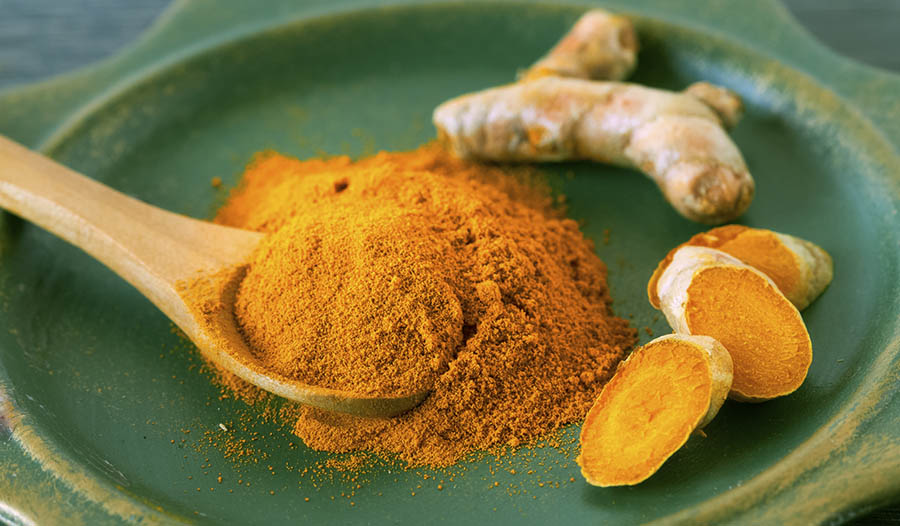Kurkuma-edut, anti-inflammatorinen mauste

Miten voit parantaa terveyttäsi? Vastaus voi olla mauste kaapissasi! Kurkuma, joka tunnetaan myös nimellä Curcuma longa ja intialainen sahrami, on inkivääriperheen juurikasvi, jota käytetään usein sen anti-inflammatoristen, antioksidanttienja ruoansulatuskanavan terveysominaisuuksien vuoksi. Kurkumiinin, kurkumasta löytyvän kemikaalin, uskotaan tarjoavan monia terveyshyötyjä. Vaikka monet ihmiset ovat käyttäneet kurkumaa mausteena ruoan parantamiseksi viimeisen 4000 vuoden ajan, kurkumalla on ollut tärkeä rooli lääketieteessä! Nykyään sen käyttöä tutkitaan edelleen vaihtoehtoisena hoitomenetelmänä monille yleisille sairauksille, vammoille ja kroonisille sairauksille.
Muutaman viime vuoden aikana olen suositellut kurkumaa potilaille ensilinjan lähestymistapana niveltulehdukseen, joka tunnetaan myös nimellä niveltulehdus. Tulokset ovat olleet hienoja. Monet potilaat ovat kertoneet minulle, että he ovat pystyneet vähentämään ei-steroidisten tulehduskipulääkkeiden ja joissakin tapauksissa huumausaineiden tarvetta.
Kurkuman historia
Intialaisessa kulttuurissa muinaisen ayurvedisen lääketieteen harjoittajat ovat suositelleet yrttejä ja kivennäisaineita lääketieteellisen parantamisen lähteiksi. Kurkuma, tahnamuodossa, levitettiin iholle moniin olosuhteisiin. Sitä hengitettiin myös höyrynä hengitysteiden tukkoisuuden vuoksi. Vaikka kliiniset tutkimukset kurkuman käytöstä näihin tarkoituksiin ovat rajallisia, nykyaikaiset Ayurvedan harjoittajat tunnustavat edelleen, että viimeisten 3000 vuoden aikana kurkuma on anekdoottisesti tarjonnut oireiden lievitystä ja tekee sitä edelleen.
Perinteisen kiinalaisen lääketieteen kurkuman tai jiang huangin käyttö vaikutti siihen, että se kykeni liikuttamaan ihmisen ”qi” eli elintärkeää energiaa. Lisäksi ihmiset uskoivat, että kurkuma paransi verenkiertoa, lievitti vatsakipuja ja auttoi palauttamaan naisten kuukautiskierron, termiä lääkärit kutsuvat amenorreaksi. Vaikka sen toimintamekanismi näissä tapauksissa ei ole vielä poistettu, perinne käyttää kurkumaa näihin tarkoituksiin elää edelleen.
Perinteinen lääketiede
Viime aikoina kurkuman käyttö integroivana lähestymistapana lääketieteellisten ongelmien hoitoon on saavuttanut edelleen suosiota. Sen käyttöä ovat suositelleet monet tunnetut lääkärit. Yksi väite on, että kurkuma-teen juominen auttaa vähentämään stressiä ja rauhoittamaan mieltä. Toinen lääkäri, joka isännöi suosittua televisio-ohjelmaa, ehdottaa, että kurkuman nauttiminen voi auttaa lievittämään nivelrikon tulehduksellisten vaikutusten aiheuttamaa kipua ja voi olla tärkeää suoliston terveydelle, koska se voi lievittää hapon refluksin aiheuttamia vatsan oireita.
Kuinka kurkuma toimii?
Vaikka tiedämme jo, että kurkuman vaikuttava aine on kurkumiini, sen tarkka vaikutusmekanismi on silti selvitettävä. Vaikuttaa kuitenkin siltä, että kurkumalla on lukuisia toimintamekanismeja, mikä selittää, miksi sitä on käytetty useisiin lääketieteellisiin ongelmiin niin kauan.
Kurkumiinin (kurkuma) auttamat olosuhteet
Niveltulehdus
Niveltulehdus on sairaus, joka on vaikuttanut ihmisiin aikojen alusta lähtien. Maailmanlaajuisesti yli 250 miljoonaa ihmistä kärsii. Ennen nykyaikaisten lääkkeiden tuloa kärsineet eivät vain kärsineet loputtomasti kivusta, vaan käyttivät luonnon yrttejä ja luomuruokaa kivun ja epämukavuuden minimoimiseksi. Nykyään, kun yhä useammat ihmiset ovat huolissaan reseptilääkkeiden sivuvaikutuksista, monet etsivät turvallisempia vaihtoehtoja.
Niveltulehdus tulee kreikan sanasta arthron, joka tarkoittaa niveltä, ja latinalaisesta sanasta itis, joka tarkoittaa tulehdusta. Siksi niveltulehdus tarkoittaa kirjaimellisesti ”niveltulehdusta”. Yleisimmät niveltulehduksen tyypit ovat nivelrikko (~ 95%) ja nivelreuma (~ 5%).
Tutkimukset osoittavat, että kurkuma auttaa vähentämään kipua sekä nivelreuman että nivelrikon hoidossa. Tutkijat ovat havainneet, että kurkuma voi vähentää tulehdusta samalla tavalla kuin useat menestyneet reseptilääkkeet. Tämä yrtti voi muuttaa NF-κB -signalointia ja vähentää tulehdusta edistävää, mikä aiheuttaa henkilölle niveltulehduksen kipua. Lääkärit kutsuvat näitä kemikaaleja COX-2 ja 5-LOX: ksi.
Vuoden 2017 tietokokoelma Tucsonissa Arizonassa paljasti, että nivelreumaa sairastavilla potilailla, jotka hoitavat itse lisähoitoja tyypilliseen määrättyyn lääkitykseen, kurkuma oli yleisimmin käytetty kasviperäinen hoito tulehdusta estävien ominaisuuksiensa vuoksi.
Sen lisäksi, että kurkumiinilisäaineet ovat hyödyllisiä niveltulehduksen kipuun, lue lisää muista luonnollisista niveltulehduksen hoidoista.
Antioksidantti
Oksidatiiviset vauriot ovat tärkein prosessi, jolla kehomme ikääntyy ja lopulta vaurioituu. Esimerkkejä hapettumisesta ovat keittiön tiskille jätetyn ilmalle altistetun omenan tai avokadon ruskistuminen. Teräspuskurin ruostuminen, kun se altistuu elementeille, on myös esimerkki hapettumisesta. Hapettumisvaurioita voivat aiheuttaa aurinko, ilma, sokeri, jalostetut elintarvikkeet ja myrkylliset kemikaalit. Hedelmät ja vihannekset, jotka sisältävät runsaasti fytokemikaaleja (kasvikemikaaleja), tarjoavat kehollemme antioksidantteja, jotka auttavat suojaamaan kehoa.
Kurkuma on myös voimakas antioksidantti, joko nautittuna mausteena ruokavaliossa tai kurkumiinilisäaineena. Oksidatiivisilla vaurioilla uskotaan yleisesti olevan aiheuttava rooli syövässä ja sydänsairauksissa. Kurkuma voi auttaa estämään hapettumista lehden vuoden 2016 raportin mukaan Diseases.
Alzheimerin tauti
Alzheimerin tauti on aivosairaus, joka vaikuttaa yleensä vanhempiin aikuisiin. Tila nimettiin tohtori Aloysium ”Alois” Alzheimerin (1864-1915) mukaan, psykiatrin mukaan, joka vuonna 1906 diagnosoi dementian naisella, joka oli kuollut outoon mielisairauteen. Sitten hän julkaisi havainnot lääketieteellisessä lehdessä. Vuonna 1912 tämä dementian muoto nimettiin Alzheimerin taudiksi.
Mitä tulee aivojen terveyteen, tohtori Dale Bredersen UCLA:sta ja vuoden 2017 kirjan Alzheimerin loppu pitää kurkumaa tärkeänä osana dementian ja Alzheimerin taudin oireiden parantamista. Monet tieteelliset tutkimukset osoittavat todisteen sen hyödyllisyydestä. Yksi tieteellinen tutkimus osoitti, että kurkuma voi vaikuttaa amyloidiplakin kertymisen vähentämiseen aivoissa. Tämän materiaalin kertymisen aivoihin uskotaan olevan Alzheimerin taudin syy. Vuoden 2017 tutkimuksessa Alzheimer's Disease todettiin, että kurkuma voi myös olla tärkeä rooli muistin menetyksen estämisessä. Kurkuman mahdollisesta roolista lievän kognitiivisen vajaatoiminnan ja viime kädessä Alzheimerin taudin estämisessä liittyy paljon jännitystä. Sitä tulisi pitää välttämättömänä täydennyksenä kaikille, jotka haluavat optimoida muistiaan.
Astma
Astma on yleinen hengityselinten sairaus lapsilla ja aikuisilla. Lääkärit määrittelevät sen krooniseksi palautuvaksi obstruktiiviseksi hengitysteiden sairaudeksi, joka reagoi albuterolilääkityshoitoon. Onneksi, jos syy selvitetään ja tila diagnosoidaan oikein, astmaa voidaan hoitaa menestyksekkäästi. Huolimatta kyvystämme hallita astman oireita, hyökkäysten estäminen on myös erittäin tärkeää. Kurkumiinilla näyttää olevan tärkeä rooli.
Vuonna 2010 tehty tutkimus on osoittanut keuhkoastman parempaa hallintaa käyttämällä kurkumaa, kun sitä käytetään boswellia serrata ja lakritsijuurenkanssa. Tulokset osoittivat astmaan liittyvän liiallisen turvotuksen ja limantuotannon paremman ehkäisyn, tulehduksen vähentämisen ja antioksidanttiominaisuuksien lisäämisen.
Vuoden 2014 tutkimuksessa Journal of Clinical and Diagnostic Research todettiin myös, että kurkuma suun kautta otettuna voi auttaa parantamaan keuhkojen toimintaa astmaa sairastavilla.
Muita sairauksia, joihin kurkuma voi auttaa tutkimusten mukaan, ovat:
- Haavainen paksusuolitulehdus (paksusuolen tulehdus)
- Suun jäkälä planus
- Diabetes
- Korkea verenpaine
- H. pylori -bakteerien aiheuttamat vatsahaavat
- Ruoansulatushäiriöt
- sappikivien ehkäisy
- Bakteeri-infektiot
- Uveiitti (silmätulehdus)
- Ateroskleroosi ja sydänsairaus
- Auttaa poistamaan elohopeaa kehosta
Internetin myötä yhä useammat ihmiset saavat tietoa ja näyttävät olevan avoimia hoidoille, joita he voivat käyttää perinteisen länsimaisen lääketieteen rinnalla.
Onko se turvallista?
Yksi eläintutkimus kurkuman myrkyllisyydestä osoitti, että aikuisille rotille, marsuille ja apinoille annettuna ei ollut kielteisiä vaikutuksia terveyteen kolmen viikon ajan. Lisätutkimukset kurkuman kulutuksen turvallisuudesta ovat perusteltuja, koska se saa edelleen laajaa huomiota lääkemuotona. On tärkeää muistaa, että kun kokeilet uusia tuotteita ensimmäistä kertaa, on aina mahdollista huomata, että sinulla on allergia tai ruokaherkkyys.
Lisäksi lääkärisi on kuultava ennen uusien lisäravinteiden kokeilemista, koska kurkuman vaikutus on ainutlaatuinen kunkin henkilön sairaudelle. Koska sinulla on mahdollisuus olla vuorovaikutuksessa nykyisten lääkkeiden kanssa tai häiritä muita lääketieteellisiä tavoitteitasi, keskustele ensin lääkärisi kanssa selvittääksesi, onko kurkuman tai sen johdannaisen kurkumiinin kulutus oikea valinta sinulle. Seuraavat ovat mahdollisia lääkkeiden yhteisvaikutuksia:
- Kurkuma- ja diabeteslääkkeet voivat lisätä alhaisen verensokerin tai hypoglykemian riskiä. Toisin sanoen kurkuma voi vähentää diabeettisten lääkkeiden tarvetta.
- Kurkuma ja verenohennusaineet voivat olla vuorovaikutuksessa. Kun kurkuma ja lääkkeet, kuten klopidogreeli (Plavix) tai varfariini (Coumadin), yhdistetään, verenvuotoriski voi olla pieni lisääntynyt. Keskustele lääkärisi kanssa ennen kuin otat niitä yhdessä.
Suositellut annokset
Monet ihmiset kuluttavat kurkumaa juomalla sitä teemuodossa, käyttämällä sitä jauheena joihinkin ihosairauksiin ja nielemällä sitä myös kapselimuodossa. Kurkumini/kurkuma-lisäravinteet otetaan yleensä annoksina 500 mg päivässä tai 500 mg enintään kolme kertaa päivässä.
Tuhansien vuosien ajan ihmiset ovat käyttäneet kurkumaa luonnollisena lääkkeenä terveysongelmiinsa, ja kuten historia ja tutkimukset osoittavat, on hyvin mahdollista, että kurkumalla on anti-inflammatorisia ja antioksidanttisia ominaisuuksia. Tasapainoisen ruokavalion nauttiminen ja fyysinen aktiivisuus ovat ratkaisevan tärkeitä monien terveysongelmien parantamiseksi. Kuitenkin kurkumamausteen lisäämisellä ruokavalioon ja kurkumiini/kurkumiinilisän nauttimisella näyttää olevan tärkeä rooli sairauksien ehkäisyssä.
Viitteet:
- Rachel Groff, Meghan Strom, Laura Hopkins, Lena Feng, Allison Hopkins jaJanet Funk. Nivelreuman itsehoitoon käytetyt ravintolisät ja ravitsemukselliset lähestymistavat Huhtikuu 2017. FASEB Journal, osa 31 nro 1, täydennys lb396
- Daily JW, Yang M, Park S. Kurkumauutteiden ja kurkumiinin tehokkuus niveltulehduksen oireiden lievittämisessä: satunnaistettujen kliinisten tutkimusten systemaattinen katsaus ja meta-analyysi. Lääkevalmisteiden lehti. 2016; 19 (8): 717-729. doi: 10.1089/jmf.2016.3705.
- Griffiths K, Aggarwal BB, Singh RB, Buttar HS, Wilson D, De Meester F.Ruoan antioksidantit ja niiden anti-inflammatoriset ominaisuudet: mahdollinen rooli sydän- ja verisuonitauteissa ja syövän ehkäisyssä. Battino M, toim. sairaudet. 2016; 4 (3) :28. doi: 10.3390/sairaudet4030028.
- Shehzad, A. ja Lee, YS (2013), Kurkumiinin toiminnan molekyylimekanismit: Signaalinsiirto. BioFactors, 39:27—36. doi: 10.1002/biof.1065
- Ravindran J, Prasad S, Aggarwal BB. Kurkumiini ja syöpäsolut: Kuinka monella tapaa curry voi tappaa kasvainsolut valikoivasti? AAPS-lehti. 2009; 11 (3): 495-510. doi: 10.1208/s12248-009-9128-x.
- Patil K, Guledgud MV, Kulkarni PK, Keshari D, Tayal S.Kurkumiinin suuhuuhtelun käyttö radiokemoterapian aiheuttamassa suun limakalvotulehduspotilaissa: pilottitutkimus. Kliinisen ja diagnostisen tutkimuksen lehti : JCDR. 2015; 9 (8): ZC59-ZC62. doi: 10.7860/JCDR/2015/13034.6345.
- Alzheimerin taudin lehti, osa 55, nro 2, sivut 797-811, 2017
- J Alzheimerin tauti 2017; 60 (2): 451-460. doi: 10.3233/JAD-170354.
- Houssen ME, Ragab A, Mesbah A, El-Samanoudy AZ, Othman G, Moustafa AF, Badria FA. Luonnolliset tulehduskipulääkkeet ja leukotrieenin estäjät täydentävänä hoitona keuhkoastmalle. Clin Biochem. 2010 heinäkuu; 43 (10-11): 887-90.
- Abidi A, Gupta S, Agarwal M, Bhalla HL, Saluja M.Kurkumiinin tehokkuuden arviointi lisähoitona keuhkoastman potilailla. Kliinisen ja diagnostisen tutkimuksen lehti : JCDR. 2014; 8 (8): HC19-HC24. doi: 10.7860/JCDR/2014/9273.4705.
- Vibha Singh, Mahesh Pal,1 Shalini Gupta,2 S.K Tiwari,1 Laxman Malkunje, ja Somdipto Das. Kurkuma - Uusi hoitovaihtoehto jäkälälle: pilottitutkimus. Natl J Maxillofac Surg. 2013 heinä-joulukuu; 4 (2): 198—201.
- kaksi: 10.4103/0975-5950.127651
- Sarkar A, De R, Mukhopadhyay AK. Kurkumiini potentiaalisena terapeuttisena ehdokkaana Helicobacter pyloriin liittyville sairauksille. Gastroenterologian maailmanlehti. 2016; 22 (9): 2736-2748. doi: 10.3748/wjg.v22.i9.2736.
- Li Y, Li M, Wu S, Tian Y.Kurkumiinin ja piperiinin yhdistelmä estää sappikivien muodostumisen C57BL6-hiirissä, joita ruokitaan litogeenisellä ruokavaliolla: osallistuuko NPC1L1/SREBP2 tähän prosessiin? Lipidit terveydessä ja sairauksissa. 2015; 14:100. doi: 10.1186/s12944-015-0106-2.
- J Appl Toxicol. 2010 heinäkuu; 30 (5): 457-68. doi: 10.1002/jat.1517.
- Shankar TN, Shantha NV, Ramesh HP, Murthy IA, Murthy VS. Kurkuman (Curcuma longa) toksisuustutkimukset: akuutteja toksisuustutkimuksia rotilla, guineapigilla ja apinoilla. Intian kokeellisen biologian lehti 1980, osa 18 nro 1, s. 73-75 ref.11
VASTUUVAPAUSLAUSEKE:Tämän hyvinvointiblogin tarkoituksena ei ole tarjota diagnooseja...





























































































